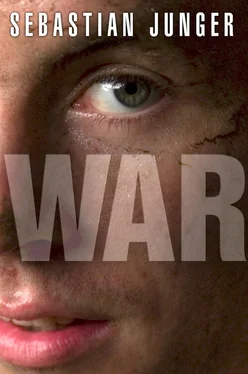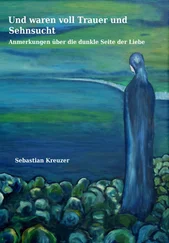The rains come in late March and the Pech quickly gets so big and violent that enemy fighters can’t cross it on foot. Nothing but combat aircraft can fly out of Bagram and logistics backs up days and then weeks. I pass through Bagram in early April and spend a few days waiting for the clouds to lift enough to see the mountains. No mountain, no flight, but I’d usually hang out at the rotary terminal just in case. No matter how many times you’ve heard it, you always turn toward the flight line when the 15s and 16s take off, a sound so thunderous and wrong that it would seem to be explainable only by some kind of apocalypse. Then the deltoid shape rising with obscene speed into the Afghan sky, its cold-blue afterburners cutting through the twilight like a welder’s torch.
One day I meet a man in civilian clothes who never moves a foot or two from a long black carrying case. We’re in a plywood building filled with bored soldiers watching women’s college basketball, and when I ask him what he does, he just nods toward the case and says, “We identify guys in the mafia and take them off the battlefield one at a time.” A day later at Jalalabad I catch a Black Hawk headed to Camp Blessing that has just dropped off an Afghan soldier in handcuffs and another one in a body bag. Blessing’s 155s are going full bore supporting a valley-wide firefight in the Korengal — every position engaged, mortars ranged in on Restrepo and the KOP — and I walk down to the batteries to watch. The great dark barrels are jacked high in the air and snort smoke sideways out their muzzle brakes every time they shoot. They pound the Korengal for an hour and then fall silent with a kind of reluctance and I walk back up the hill to lie back down on my bunk and wait for the weather to clear. Rear-base limbo: an ill blend of apprehension and boredom that is only relieved by going forward where things are even worse.
"I killed my first bear with a bow and arrow in Alaska,” Lambert says.
After days of waiting around air bases I’ve finally made it out to Restrepo. It’s a slow, hot day — the storm systems have been pushed out to the west — and the talk has turned to hunting.
“Do you have a sidearm with you when you hunt like that?” Patterson asks.
“Fuck yeah.”
Lambert says that when he was a kid he’d get up early to go duck hunting and would show up at school covered in duck blood.
“You ever go frog gigging?” Patterson asks.
“Fuck yeah,” says Lambert.
“You ever go squirrel hunting?”
“Fuck yeah. With a little four-ten?”
“You ever go cow hunting?”
“Come on…”
Patterson tells a story about a cow that got caught in the crotch of a tree and no one could get it out. “We tried shooting it out but that didn’t work either,” he says.
The topic of cow hangs heavily in the air. A few weeks earlier the men spotted a lone cow wandering along the ridge and chased it into the concertina wire that’s strung around the base. Once the cow was tangled up they didn’t have much choice but to gaffer-tape a combat knife to some tentpoles and kill it caveman-style. By coincidence — or not — a black kid named Lackley, who works full-time as a cook down at the KOP, had just made the trek up to Restrepo to get into a firefight and claim his combat action badge. (It worked.) Once the cow was dead Lackley and Murphy gutted it and cut the head off with a Christmas tree saw and then Lackley prepared a recipe that became known as “same-day cow.” He cut strips of meat off the haunches and wrapped them around onions that he got from the Afghan soldiers and then grilled them up on a bonfire outside the Weapons Squad hooch. He used Hesco siding stripped of its liner as a grill. Aside from a couple of frozen steaks they carried up from the KOP it was the first red meat the men had had at Restrepo in almost a year.
The meal was some kind of Lord of the Flies turning point — there were only four months to go and standards were starting to slip — but there were consequences. One afternoon soon after I arrive, three old men come walking in from Obenau and stop at the front gate. At first Patterson is pleased — this is the first time elders have made the trip to Restrepo, which can only mean good things about the hearts-and-minds campaign — but not everyone is convinced. “I think this is about the cow,” O’Byrne tells me in a low voice as we walk over to where the meeting is going to happen. The elders sit on a row of sandbags by the ANA hooch and Patterson and Abdul, the interpreter, sit facing them. The elders don’t take long to get to the point.
“The cow?” says Patterson. “The reason why we killed it was because it ran into our concertina wire and, uh, it was mangled inside the concertina wire, so we had to kill it to put it out of its misery. That’s why we killed it.”
“They are asking because it’s illegal,” says Abdul.
“Illegal?”
“Yeah, illegal.”
“Like, it was caught in the wire and it was already dead in the wire, so that’s, I mean, there was nothing else that we could really do.”
“The owner of the cow is a poor person, he is a poor guy,” says Abdul, “so what is your opinion about the cow? What do you want to do? Just tell them.”
“Like how much does a cow cost?” says Patterson.
“Like five hundred bucks.”
“Five hundred bucks? Is that Afghani or American?”
“Of course, American.”
Patterson says he has to check with his commander and he gets up and walks into the radio hooch. He gets Kearney on the line and the first thing Kearney wants to know is whether or not his men killed the cow.
“It was tangled up in our wire pretty much dead,” Patterson answers. “Two-four ended up cuttin’ it up, over.”
Kearney says that as long as his soldiers didn’t actually kill the cow he doesn’t owe any money, but the owners can claim as much HA — “humanitarian aid” — as they want: rice, beans, flour, cooking oil, blankets. Patterson goes back to the elders and delivers the verdict. All they want is money. Patterson says it’s HA or nothing, and they ask how much of it they could get.
“Whatever the weight of the cow was, will be the weight of HA,” says Patterson.
It’s an inspired bit of Old Testament justice, and one of the Afghan soldiers laughs when he hears it. Even the elders smile. After a while they stand up and shake hands and make their way up the steep slopes of the outpost to the southern gate. It’s not clear what they’re going to do but I’m pretty sure we haven’t heard the last of the cow. Later I point out to O’Byrne that they actually did kill the cow.
“Well, it was pretty badly tangled up in the wire,” he says.
“It was tangled up in the wire because you guys chased it in there.”
“Okay,” he says, “it’s a gray area.”
A few days later we leave the hilltop after midnight and go creeping into Karingal with so little illume that even the soldiers have trouble seeing with their night vision gear. There are puddles in the road and stars are reflected in them as if we’re walking through fragments of sky. A valley dog barks and another picks it up and by the time we arrive in Karingal the town is deserted except for one teenage boy who produces a sullen evasiveness that is unmistakable even without a common language. We get hit on the way out just as everyone expected — “Another well-timed patrol so we can get lit the fuck up,” as Moreno once said — and we come back at a run up a pretty creekbed with mortars shrieking over our heads and Restrepo’s .50 hammering away protectively. At one point someone fires two or three bursts from behind a rock wall and Alcantara wants to know what the man is shooting at.
“I don’t know, I just figure one of us should fucking return fire,” comes the answer.
Читать дальше
Конец ознакомительного отрывка
Купить книгу












